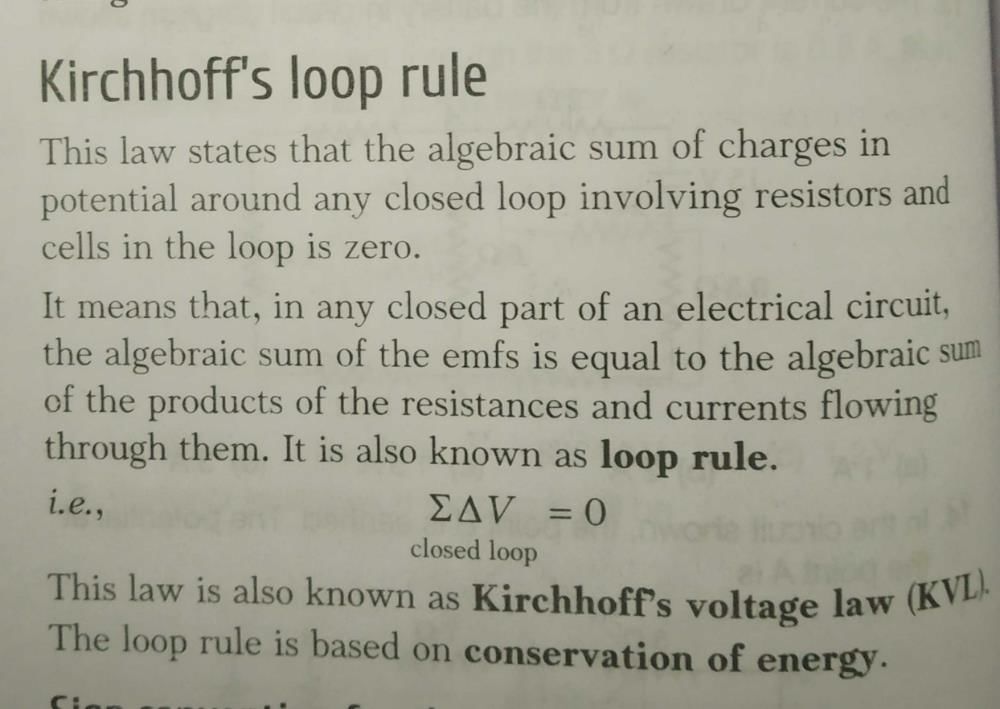Class 12 Exam > Class 12 Questions > Can you explain the answer of this question b...
Start Learning for Free
Can you explain the answer of this question below:
The ______ of changes in potential around any closed loop involving resistors and cells in a loop is zero.
- A:product
- B:algebraic sum
- C:difference
- D:sum of absolute values
The answer is b.
Verified Answer
Can you explain the answer of this question below:The ______ of change...
In accordance with Kirchhoff’s second law i.e. Kirchhoff’s voltage law (KVL), the algebraic sum of all the potential differences in a closed electric circuit or closed loop that contains one or more cells and resistors is always equal to zero.
This law is popularly called the law of conservation of voltage.
This law is popularly called the law of conservation of voltage.
Most Upvoted Answer
Can you explain the answer of this question below:The ______ of change...
In accordance with Kirchhoff’s second law i.e. Kirchhoff’s voltage law (KVL), the algebraic sum of all the potential differences in a closed electric circuit or closed loop that contains one or more cells and resistors is always equal to zero.
This law is popularly called the law of conservation of voltage.
This law is popularly called the law of conservation of voltage.
Free Test
FREE
| Start Free Test |
Community Answer
Can you explain the answer of this question below:The ______ of change...


|
Explore Courses for Class 12 exam
|

|
Similar Class 12 Doubts
Can you explain the answer of this question below:The ______ of changes in potential around any closed loop involving resistors and cells in a loop is zero.A:productB:algebraic sumC:differenceD:sum of absolute valuesThe answer is b.
Question Description
Can you explain the answer of this question below:The ______ of changes in potential around any closed loop involving resistors and cells in a loop is zero.A:productB:algebraic sumC:differenceD:sum of absolute valuesThe answer is b. for Class 12 2025 is part of Class 12 preparation. The Question and answers have been prepared according to the Class 12 exam syllabus. Information about Can you explain the answer of this question below:The ______ of changes in potential around any closed loop involving resistors and cells in a loop is zero.A:productB:algebraic sumC:differenceD:sum of absolute valuesThe answer is b. covers all topics & solutions for Class 12 2025 Exam. Find important definitions, questions, meanings, examples, exercises and tests below for Can you explain the answer of this question below:The ______ of changes in potential around any closed loop involving resistors and cells in a loop is zero.A:productB:algebraic sumC:differenceD:sum of absolute valuesThe answer is b..
Can you explain the answer of this question below:The ______ of changes in potential around any closed loop involving resistors and cells in a loop is zero.A:productB:algebraic sumC:differenceD:sum of absolute valuesThe answer is b. for Class 12 2025 is part of Class 12 preparation. The Question and answers have been prepared according to the Class 12 exam syllabus. Information about Can you explain the answer of this question below:The ______ of changes in potential around any closed loop involving resistors and cells in a loop is zero.A:productB:algebraic sumC:differenceD:sum of absolute valuesThe answer is b. covers all topics & solutions for Class 12 2025 Exam. Find important definitions, questions, meanings, examples, exercises and tests below for Can you explain the answer of this question below:The ______ of changes in potential around any closed loop involving resistors and cells in a loop is zero.A:productB:algebraic sumC:differenceD:sum of absolute valuesThe answer is b..
Solutions for Can you explain the answer of this question below:The ______ of changes in potential around any closed loop involving resistors and cells in a loop is zero.A:productB:algebraic sumC:differenceD:sum of absolute valuesThe answer is b. in English & in Hindi are available as part of our courses for Class 12.
Download more important topics, notes, lectures and mock test series for Class 12 Exam by signing up for free.
Here you can find the meaning of Can you explain the answer of this question below:The ______ of changes in potential around any closed loop involving resistors and cells in a loop is zero.A:productB:algebraic sumC:differenceD:sum of absolute valuesThe answer is b. defined & explained in the simplest way possible. Besides giving the explanation of
Can you explain the answer of this question below:The ______ of changes in potential around any closed loop involving resistors and cells in a loop is zero.A:productB:algebraic sumC:differenceD:sum of absolute valuesThe answer is b., a detailed solution for Can you explain the answer of this question below:The ______ of changes in potential around any closed loop involving resistors and cells in a loop is zero.A:productB:algebraic sumC:differenceD:sum of absolute valuesThe answer is b. has been provided alongside types of Can you explain the answer of this question below:The ______ of changes in potential around any closed loop involving resistors and cells in a loop is zero.A:productB:algebraic sumC:differenceD:sum of absolute valuesThe answer is b. theory, EduRev gives you an
ample number of questions to practice Can you explain the answer of this question below:The ______ of changes in potential around any closed loop involving resistors and cells in a loop is zero.A:productB:algebraic sumC:differenceD:sum of absolute valuesThe answer is b. tests, examples and also practice Class 12 tests.

|
Explore Courses for Class 12 exam
|

|
Signup for Free!
Signup to see your scores go up within 7 days! Learn & Practice with 1000+ FREE Notes, Videos & Tests.





















